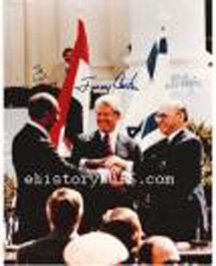JIMMY CARTER ON THE HAMAS VICTORY

The ever-wise Jimmy Carter opines on what the Hamas victory might mean to peace hopes for Israel and Palestine.
As for the death of peace hopes, Carter offered a steely gaze, and unleashed a laundry list of reasons why the question is ridiculous.
"Remember, we're not interrupting a major, successful, promising peace process. There haven't been any peace talks for the last 3 1/2 years. For almost three years, the elected leader of the Palestinian people (Arafat) was imprisoned in two or three rooms in Ramallah and was not permitted to leave his office," said Carter.
"And then once Mahmoud Abbas was elected a year ago, we thought this would open a fairly immediate opportunity for peace talks. But there haven't been any peace talks. There hasn't been any real effort to strengthen Abbas's international stature, or his economic ability to manage his government's needs or meet his people's needs. There hasn't been any willingness on the part of outside forces to equip his security people with the ability to control violence.
"He's been put into a holding pattern. So we're not interrupting a peace process by this election. And it may be that what I consider to be a stalemate could possibly be invigorated. I won't say reinvigorated because there's no vigour there now."
But if a victorious Hamas is to take the Palestinians forward, a discernable voice must arise. Hamas can no longer be a multi-headed hydra, saying both yes and no to negotiations from its many mouths. A cohesive leadership is essential, and it must say what it really wants. That will require some breathing space as the dust over Ramallah settles, and the newly elected work toward forming a new government. But time is of the essence, insofar as the Palestinian Authority is destitute.
By Carter's reckoning, the Authority will run out of funds to pay its workers — everyone from policemen to schoolteachers, at the end of February.
He's urging Western donors to find a way to work around their objections to Hamas and continue giving, at least until Hamas makes its intentions known. And he's calling on the cash-rich Arab world, now "inundated with oil revenues," to step up with financing to get Palestinians through this crisis.
Former Swedish prime minister Carl Bildt, one of Carter's colleagues in the mission to Jerusalem, yesterday framed the situation thus: "The motives for a two-state solution can be said to be even strong in a situation where, after all, what we have asked for — the establishment of democracy in these territories — has occurred.
"The fact that we got democracy functioning should not really be used as an argument for withdrawing our engagement."
Carter professes no insight into whether Hamas is capable of the challenge of leadership. But he's old enough to have seen many in this region make the transition from terror to power with aplomb."Despite the concerns expressed about the character of Hamas, we have to hope for the best. My prayer is the Hamas leaders, now serving in positions of unprecedented authority, will lead the Palestinian people on a peaceful, non-violent path toward a two-state solution."
Tags: Jimmy Carter, Hamas





0 Comments:
Post a Comment
<< Home